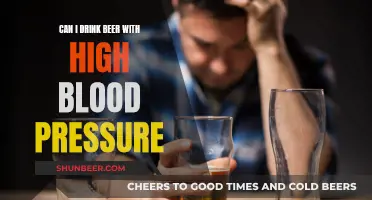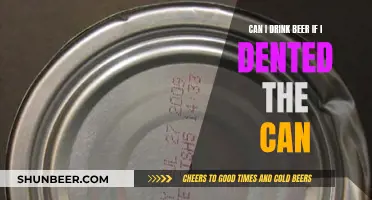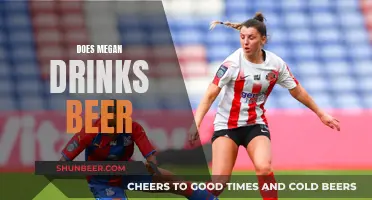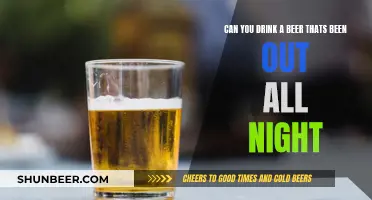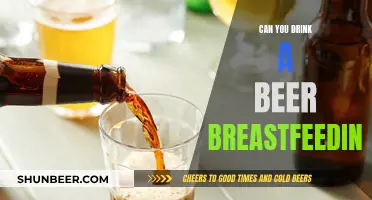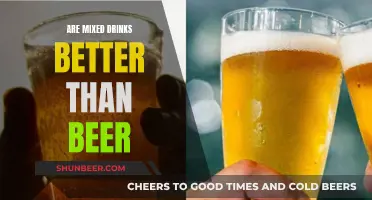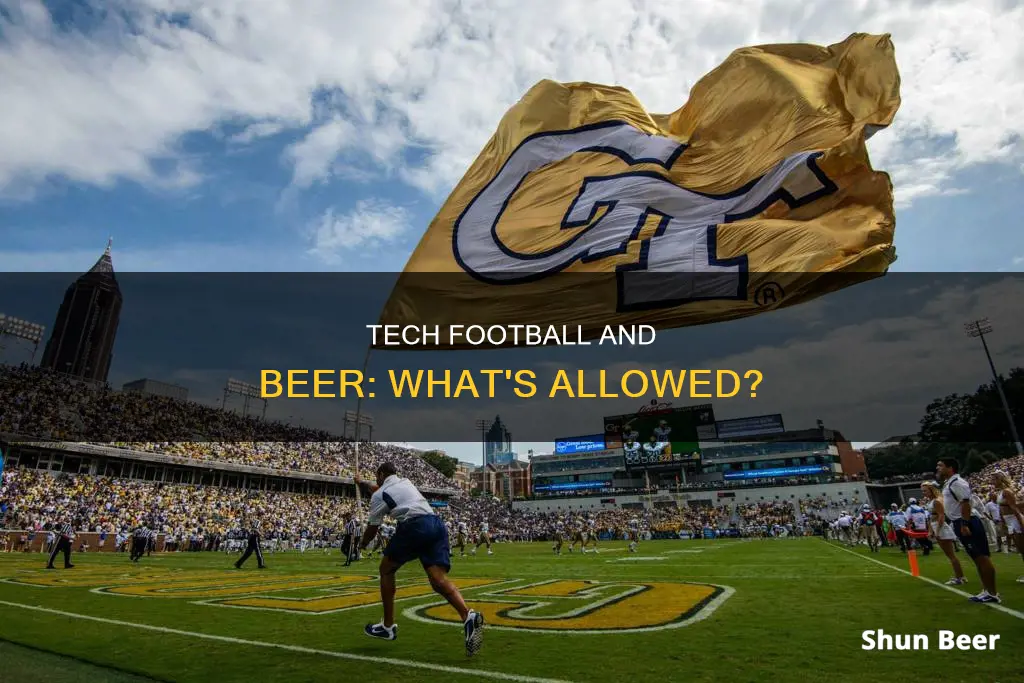
Beer and football have long gone hand-in-hand, and in recent years, more and more colleges have allowed fans to enjoy a cold one while cheering on their team. In 2019, the Southeastern Conference (SEC) lifted its ban on alcohol sales at conference-sanctioned sporting events, and in 2020, for the first time in its history, Bobby Dodd Stadium started selling alcoholic beverages throughout the premises during Georgia Tech football games. The University of Georgia, however, has decided to withhold alcohol sales to the general public at football games in 2023, and the state of Utah has some of the strictest liquor laws in the US, with no FBS teams in the state able to sell alcohol in football stadiums.
| Characteristics | Values |
|---|---|
| Alcohol sales | Alcohol is sold at Bobby Dodd Stadium during Georgia Tech football games |
| Alcohol type | Beer, wine, and selzters are available |
| Alcohol brand | Bud Light, Michelob Ultra, Blue Moon, Coors, Miller Lite, SweetWater 420 Extra Pale Ale, Blind Pirate, and Slap Fight |
| Alcohol policy | Guests must be 21+ and present a valid ID for purchase |
| Number of drinks | Limited to 2 drinks per legal ID per transaction |
| Sales timings | Sales end with the completion of the third quarter |
| Drinking and carrying | Guests cannot enter or leave the stadium with an alcoholic beverage |
| Intoxication | Visibly intoxicated guests will not be permitted to enter the venue or be served/sold alcohol |
| Unruly behaviour | Fans exhibiting unruly, disruptive, or illegal behaviour will be removed from the facility |
| Student section | Students who wish to consume alcohol must visit the designated ID check station to receive a wristband and a hand stamp |
| Alcohol-related issues | Can be reported by texting "BUZZ" to 78247 or by notifying the nearest stadium event staff |
What You'll Learn

Alcohol sales at Georgia Tech football games
The change in policy allowed fans to purchase a range of alcoholic drinks, including beer, wine, and hard seltzers. However, there are certain restrictions in place. Guests must be 21 years of age and present a valid ID to purchase alcohol, with a limit of two alcoholic beverages per ID per transaction. Alcohol sales end at the conclusion of the third quarter, and guests are not permitted to enter or leave the stadium with alcoholic beverages. The university also encourages fans to drink responsibly and reserves the right to refuse service to anyone at its discretion.
Students who wish to consume alcohol within the student section must visit a designated ID check station to receive a wristband and a hand stamp. Students consuming alcohol without the proper identification will face disciplinary action, including removal from the student section and confiscation of their beverage. Additionally, students of legal drinking age who provide alcohol to underage students will also be subject to disciplinary measures.
While the availability of alcohol at Georgia Tech football games has been well-received by some, there have also been concerns about the potential for alcohol-related issues. The university has implemented reporting procedures for any alcohol-related incidents, and unruly or disruptive behavior will not be tolerated. Overall, the sale of alcohol at Georgia Tech football games reflects a broader trend of colleges and universities loosening restrictions on alcohol sales during sporting events.
Beer and Ice Cream: A Delicious Combination or a Disaster?
You may want to see also

Alcohol policies at Bobby Dodd Stadium
Alcoholic beverages are available for purchase at Bobby Dodd Stadium during Georgia Tech football games. Beer and wine are sold in all general areas of the stadium, with guests limited to two alcoholic drinks per valid ID, per transaction. Alcohol sales end at the conclusion of the third quarter, and guests are not permitted to enter or leave the stadium with alcoholic beverages. All sales comply with the relevant jurisdiction for alcohol policy within the State of Georgia, and guests must be 21 years of age or older to purchase alcohol.
Guests who appear to be impaired or intoxicated may be denied entry or ejected from the stadium. The Georgia Tech Athletic Association (GTAA) and the Georgia Institute of Technology encourage guests to drink responsibly and reserve the right to refuse service to anyone at their discretion. To promote responsible drinking, the stadium has implemented a designated ID check station for students wishing to consume alcohol within the student section. Students consuming alcohol without a wristband and hand stamp will be removed, and those under 21 years of age will be issued an underage drinking citation.
Outside alcohol is prohibited from being brought into the stadium, and guests are encouraged to report any alcohol-related issues by texting "BUZZ" to 78247 or notifying the nearest stadium event staff. The stadium also offers a variety of non-alcoholic beverage options, including complimentary water bottle filling stations located throughout the facility.
The availability of alcohol at college football games has evolved over the years, with the NCAA and conferences loosening rules and allowing more universities to sell alcohol. However, some schools and states, such as Utah, continue to restrict alcohol sales at college football stadiums.
Plato's Beer: The Science Behind It
You may want to see also

History of alcohol sales at college football games
Alcohol sales at college football games have undergone a significant evolution in recent years, shifting from a rare occurrence to a widespread practice. Historically, alcohol sales at college football venues were uncommon, with concerns about promoting alcohol abuse and the legal drinking age serving as deterrents. However, the desire to boost revenue and enhance the fan experience has driven a relaxation of rules by the NCAA and conferences, leading to a notable increase in alcohol availability.
Over the past decade, the sale of beer and wine inside college football stadiums has become the norm, with a growing number of schools embracing this trend. In 2023, 88% of FBS schools sold alcohol during college football games, marking a significant jump from previous years. This shift can be attributed to the NCAA and conferences loosening their regulations, as well as universities seeking new revenue streams and ways to attract fans.
The decision to sell alcohol at college football games is driven by economic factors and the aim to enhance the fan experience. Athletic departments recognise the potential to boost revenue and compete with other entertainment options. Additionally, the availability of alcohol can prolong the time fans spend in the stands and reduce incidents of rowdy behaviour related to binge drinking.
However, this development is not without controversy. Some universities have expressed concerns about the impact on student behaviour and the potential for excessive drinking. There are worries about binge drinking, disorderly conduct, and violence. To mitigate these risks, universities have implemented measures such as limiting drink quantities and providing designated driver programs.
The University of Iowa's experience illustrates the complex dynamics of alcohol sales at college football games. In 2021, the university began selling alcohol to spectators for the first time, and a study was conducted to assess its impact on alcohol-related emergency department visits and EMS calls. Interestingly, the study found no significant increase in alcohol-related emergencies, and the university benefited financially from the sales.
In conclusion, the history of alcohol sales at college football games has witnessed a transformation from rarity to widespread acceptance. While the availability of alcohol at college football stadiums has become more common, the impact of this change continues to be evaluated and navigated by universities, with a focus on balancing revenue, fan experience, and health considerations.
Get Rid of Your Beer Gut: Tips for a Trimmer You
You may want to see also

Alcohol sales at other Power 5 schools
Alcohol sales have become a common feature of Power 5 schools' football games, with 80% of major college football schools selling alcohol inside their stadiums. This shift has occurred over the past decade, driven by the desire to increase revenue and attract more fans to the venues. The sale of alcohol at college football games was rare more than 10 years ago, and when it did occur, it was typically restricted to Power 5 schools with premium seating areas or suites.
The University of Georgia is an example of a school that previously limited alcohol sales to premium seating areas. In 2023, however, the university decided to expand alcohol sales to include basketball and baseball games at specific venues. Despite this expansion, the University of Georgia has maintained its stance against public alcohol sales at football games in 2023, with a university spokesperson confirming that there were no internal discussions about changing this policy.
Other Power 5 schools, such as the University of Wisconsin, have also resisted the trend of selling alcohol to the general public at football games. However, the University of Wisconsin has indicated a potential shift in its approach, stating that if their fan experience metrics increase, they would consider selling alcohol at football games. This cautious approach is shared by the University of Michigan, which is waiting to observe the impact of alcohol sales at basketball and hockey games before making a decision about football games.
In contrast, some Power 5 schools have embraced the sale of alcohol at football games. For instance, Georgia Tech started selling alcoholic beverages throughout Bobby Dodd Stadium during football games in 2020, marking a departure from the previous restriction to premium-seating areas. Similarly, the University of North Carolina has been selling alcohol for five seasons, generating approximately $4 million in sales. This revenue stream has been particularly beneficial for the school's athletic department, which typically operates at a loss.
The variation in alcohol sales policies among Power 5 schools reflects the autonomy granted by conferences, allowing each school to decide whether to implement alcohol sales and determine the specifics of their implementation. This flexibility enables schools to consider factors such as fan experience, revenue generation, and community sentiments when formulating their alcohol sales policies.
Antibiotics and Alcohol: A Risky Mix?
You may want to see also

Alcohol sales at SEC stadiums
Alcohol sales at college football games have become increasingly common in recent years. In 2023, 88% of FBS schools sold alcohol, up from 32% in 2019. This shift follows the NCAA and conferences loosening rules and allowing universities to sell alcohol.
The Southeastern Conference (SEC) officially lifted its ban on stadium-wide alcohol sales in August 2019, leaving the decision to sell alcohol at sporting events to individual institutions. This decision was likely driven by the desire to increase revenue and boost attendance, with some arguing that it could also reduce alcohol-related incidents and binge drinking.
Several SEC schools, including Arkansas, LSU, Missouri, Tennessee, Texas A&M, and Vanderbilt, quickly moved to add alcohol sales to football concessions. Texas A&M's gross total alcohol revenue for 2019 was approximately $2.4 million, with a net commission increase of roughly $500,000. Other schools, such as Alabama, Georgia, Kentucky, and Auburn, have continued to sell alcohol in a limited capacity in premium areas but have not extended sales to the general public.
While the sale of alcohol at college football games can enhance the fan experience and increase revenue, there are also concerns about potential negative consequences. These include increased underage drinking, a less family-friendly environment, negative fan behaviour, and mixed messages about alcohol consumption to students, who may be more susceptible to addiction.
As of 2023, the University of Georgia has decided to continue withholding alcohol sales to the general public at football games, maintaining sales only in club areas that require donations to the athletic program. This decision considers the complexity of expanding alcohol sales to a stadium with over 90,000 people and the potential impact on the overall game-day experience.
Beer and VSG: What You Need to Know
You may want to see also
Frequently asked questions
Yes, alcoholic beverages are available for purchase at Georgia Tech football games. However, there are certain restrictions in place. Beer is available in the club section of the stadium, but not in general seating. Only guests who are 21 years of age and present a valid ID are permitted to purchase alcohol, with a limit of two drinks per ID per transaction. Alcohol sales end at the conclusion of the third quarter.
A variety of alcoholic beverages, including beer, wine, hard seltzers, and cocktails, are available at Georgia Tech football games. Popular beer options include Bud Light, Michelob Ultra, Blue Moon, Coors, and Miller Lite.
Yes, Georgia Tech has strict alcohol policies and procedures in place to ensure responsible drinking. Visibly intoxicated guests will not be permitted to enter the venue or purchase alcohol. Additionally, guests are not allowed to bring alcoholic beverages into or out of the stadium.


